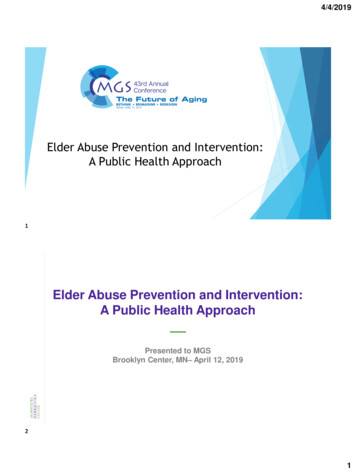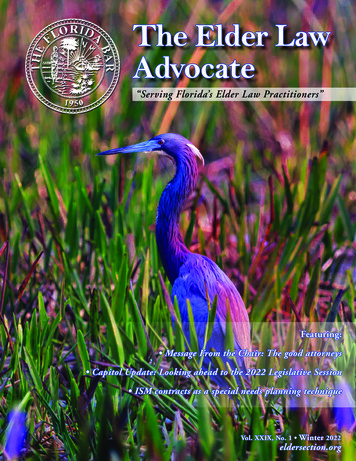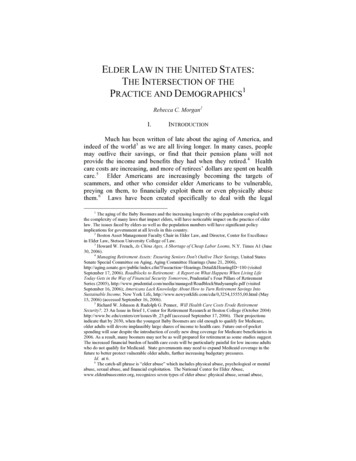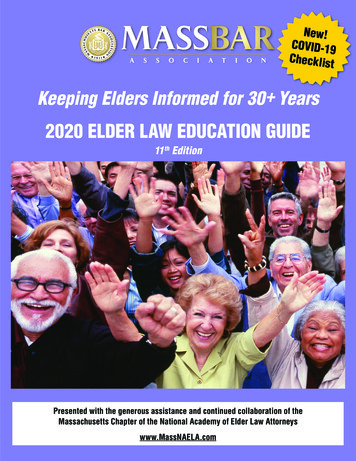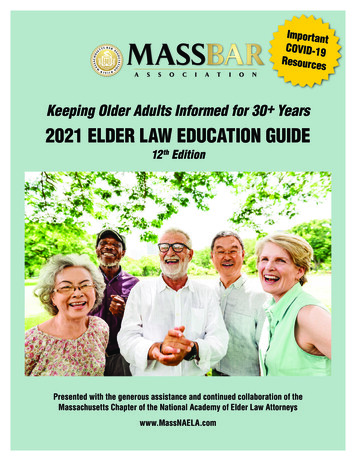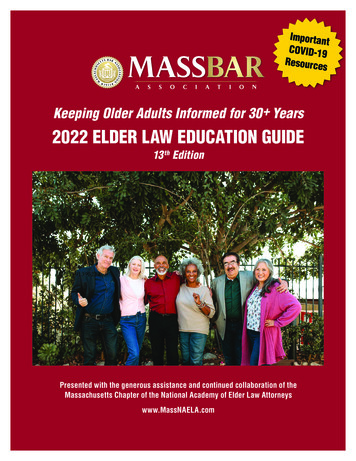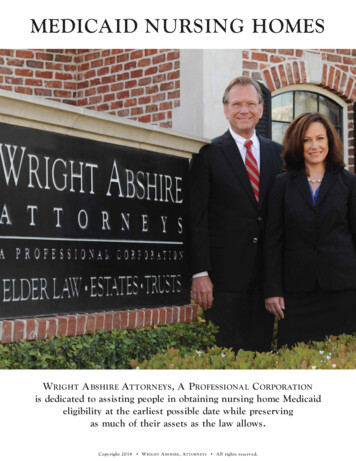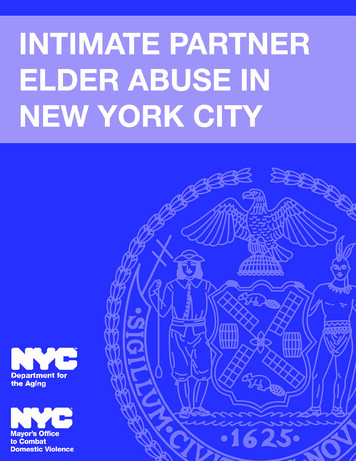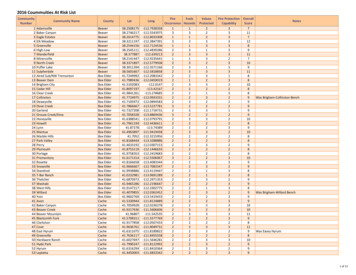
Transcription
Ohio State Bar AssociationElder LawAttorney Information and StandardsAccredited by theSupreme Court Commissionon Certification of Attorneys as Specialists
ContentsElder Law . 2SECTION 1: INTRODUCTION & POLICY STATEMENTS . 2SECTION 2: DEFINITIONS . 3SECTION 3: AUTHORITY . 3SECTION 4: CREATION OF THE SPECIALTY BOARD . 4SECTION 5: CERTIFICATION REQUIREMENTS . 4SECTION 6: DUTY TO SUBMIT ANNUAL REPORT, ANNUAL FEE . 7SECTION 7: CERTIFICATION PERIOD AND RE-CERTIFICATION . 8SECTION 8: ADOPTION AND AMENDMENT . 8SECTION 9: FEES . 9SECTION 10: APPEALS PROCEDURE . 91
ATTORNEY INFORMATION & STANDARDSOhio State Bar AssociationSpecialty CertificationElder LawSECTION 1: INTRODUCTION & POLICY STATEMENTS1.1IntroductionThe Ohio State Bar Association Elder Law Specialty Certification Program is accredited by theOhio Supreme Court Commission on Certification of Attorneys as Specialists (CCAS).This document outlines the Standards by which the OSBA will certify attorneys as specialists in thefield of Elder law. These Standards will ensure that an attorney Certified under this program possesses anenhanced level of skill and expertise as well as substantial involvement in Elder Law . These Standards arefurther designed to foster professional development and expertise and to enable the Association tothoroughly evaluate the credentials of attorneys seeking Certification.Finally, the ultimate function and most important goal of these standards is to facilitate public accessto appropriate legal services.1.2Nondiscrimination StatementThe OSBA Elder Law Specialty Board Certification Program does not discriminate against lawyersseeking Certification on the basis of race, color, national origin, religion, gender, sexual orientation,disability or age. Experience requirements for lawyers seeking Certification that may have an effect on aparticular age group are reasonable.1.3Organization StatementThe OSBA, founded in 1880, is a voluntary professional association open to any person who hasbeen admitted to the practice of law, law school students and legal assistants sponsored by an OSBAmember.From the date of its founding until today, the Association’s working goals have been to: advance the science of jurisprudence;promote improvements of the law and administration of justice;uphold integrity, honor and courtesy in the legal profession and encourage and enforce adherence tohigh standards of professional conduct;take positions on matters of public interest as deemed advisable;encourage thorough legal education;cultivate cordial relations among members of the Bar; andperpetuate the history of the profession and the Association.2
SECTION 2: DEFINITIONS2.1As used in these Standards:(A)“Applicant” -- An attorney applying to be certified as a specialist under these Standards.(B)“Application form” -- The form created and/or approved by the Association, theSpecialization Committee and/or the Specialty Board, as may be applicable, that is used to apply forcertification under these Standards.(C)“Association or OSBA” -- determined, between October1st and December 1st of each year that an attorney is certified under theseStandards. Annual reports must be accompanied by annual fees as established by the fee schedule of theOSBA, section 9 hereof. The Specialty Board, by an affirmative vote of the majority of its members, mayde-certify an attorney previously certified under the Standards if material changes reported on the affidavitor form, or that may otherwise come to the Specialty Board’s attention, are such that the attorney involvedwould no longer be qualified for certification or re-certification under the Standards. Any attorney so decertified may request reconsideration and, if denied, appeal such de-certification pursuant to the proceduresoutlined by these Standards under Section 10: Appeals Procedure. or any such subcommittee thereofconvened for such purposes.Any attorney certified under the Standards who has his or her license to practice law in the State ofOhio revoked or suspended shall automatically be deemed de-certified as of the date of said revocation orsuspension without regard for the procedures listed in the foregoing paragraph. Upon any later reinstatement7
of the license to practice law in the State of Ohio, such reinstated attorney would be eligible to reapply forcertification under the Standards.SECTION 7: CERTIFICATION PERIOD AND RE-CERTIFICATION7.1The certification period under these Standards is a period of six years.7.2In the calendar year preceding the expiration date of an attorney’s certification under these standards,hereinafter referred to as “the calendar year”, an attorney certified under the standards must apply forrecertification under the same criteria as set forth in Section 5 hereof, with the exception of sub-section 5.4(written examination) and provided that the CLE criteria shall be as set forth in Section 6.2 hereof.Applications for recertification shall be available between October 1st and December 1st of the calendar year.If a full and complete application is not completed by December 31 of the calendar year, the applicant shallbe decertified, and must apply for recertification under the same criteria as set forth in Section 5 hereofincluding the written examination.(a) A certified specialist may exempt from the requirements of Section 6.2 & Section 7 of these standards inthe event of a severe, prolonged illness or disability that prevents the specialist from participating inaccredited continuing legal education programs and activities and in the requirements for certificationrenewal established by the Commission and the OSBA as follows:(1) Before the deadline for recertification, the lawyer shows, by a preponderance of the evidenceand to the satisfaction of the certifying organization, that completing the requirements forrecertification presents an extreme hardship and that recertification is significantly more difficultas a result of the severe, prolonged illness or disability;(2) After the deadline for recertification, the lawyer shows, by a preponderance of the evidence andto the satisfaction of the certifying organization, that completing the requirements for recertificationpresented an extreme hardship, that recertification was significantly more difficult as a result of thesevere, prolonged illness or disability, and that there exists an adequate explanation as to why thelawyer did not seek exemption prior to the end of the lawyer’s certification period.(3) The duration of an exemption granted pursuant to Section 7.2 (a) of this section shall bedependent upon the severity of the lawyer’s illness or disability and may be limited, as determinedby the OSBA and the specialty board.SECTION 8: ADOPTION AND AMENDMENT8.1These Standards were effective upon the approval thereof by the Association’s Board of Governorsand the Supreme Court Commission.8.2The power to amend these Standards is vested in the Elder Law Specialty Board, subject only toreview and approval by the OSBA the Association’s Board of Governors, and/or the Commission.8.3The Standards further incorporate any further rules or regulations that the Commission may laterissue as to the creation of a specialty plan or a specialty board. Any language in these Standards that iscontrary to any provisions of any Commission future rules or regulations is deemed to be null and void andis to be replaced by such contrary language, subject only to the Elder Law & Special Needs Committee’sdecision to withdraw its Plan of Specialization.8
SECTION 9: FEES9.1Application fee: Applicants must submit a one-time non-refundable application fee:OSBA member: 250Non-members: 3009.2Exam fee: Applicants must pay a non-refundable exam fee each time the exam is administered:OSBA members/ 225Non-members: 2759.3Annual reporting fee: Applicants must pay a non-refundable annual reporting fee each year aftercertification of:OSBA member: 125Non-member: 1759.4Re-certification fee: Applicant must pay a non-refundable recertification fee of:OSBA members 200Non-member: 250SECTION 10: APPEALS PROCEDURE10.1Notice of Action. An applicant who is denied certification, or a specialist who is deniedrecertification, will be notified by registered or certified mail sent to the lawyer's last known address of theOSBA Specialty Board's ("Board") decision ("Notice"). The reasons for the Board's action shall be set forthin that Notice. The Notice shall advise the lawyer that he or she may file, within 30 days of the receipt of theNotice, a Request for Reconsideration of the Board’s decision.10.2Reconsideration. The Request for Reconsideration shall include any additional information orsupporting material that the lawyer believes will help the Board in its reconsideration of the initial decision.The Board’s decision shall be reconsidered by the entire Board or a committee of the Board appointed bythe chairperson.The Board shall send the reconsideration decision in writing to the applicant or specialist by registered orcertified mail within 45 days of the receipt of the Request for Reconsideration setting forth the reasons forthe decision. The Board shall notify the applicant or specialist that he or she may, within 30 days of thereceipt of the decision on Reconsideration, appeal in writing to an Independent Review Panel.10.3Independent Review Panel. If a request by an applicant or a specialist is made for an appeal to anIndependent Review Panel, the chair of the OSBA Specialization Committee shall appoint a three-personIndependent Review Panel. The Independent Review Panel shall include at least two persons whose practiceis primarily in the same specialty area. When the subject of the appeals relates to a matter of substantivelaw, the entire Independent Review Panel shall be comprised of persons whose practice is primarily in thesame specialty area. No member of the Review Panel shall have had previous involvement in consideringthe applicant's or specialist's applications.10.4Hearing. The hearing before the Independent Review Panel will be de novo. The Board may senda representative to the Independent Review Panel hearing. The Independent Review Panel may considerany relevant evidence, including hearsay, if it is the type of evidence upon which reasonable persons rely,regardless of the existence of any common law or statutory rule which might make improper the admissionof such evidence over objection in civil actions. The rules of privilege shall be effective to the same extentthat they are recognized in civil actions. The Independent Review Panel may exclude incompetent,9
irrelevant, immaterial and unduly repetitious evidence.The Independent Review Panel shall report its findings, and decision to the Board. The Board shall notifythe applicant or specialist of that decision by registered or certified mail sent to the lawyer's last knownaddress.The decision of the Independent Review Panel shall be final.Adopted by the Board of Governors 2008Amended by the Board of Governors December 12, 2014Amended by the Board of Governors – February 16, 201810
recommendation of the chair of the OSBA Elder Law and Special Needs Committee and the Chair of the Elder Law Specialty Board. The chair of the OSBA Elder Law and Special Needs Committee shall be an ex-officio member of the Specialty Board. 4.3 All Specialty Board members serve on a volunteer basis, without pay, and are not considered to be
